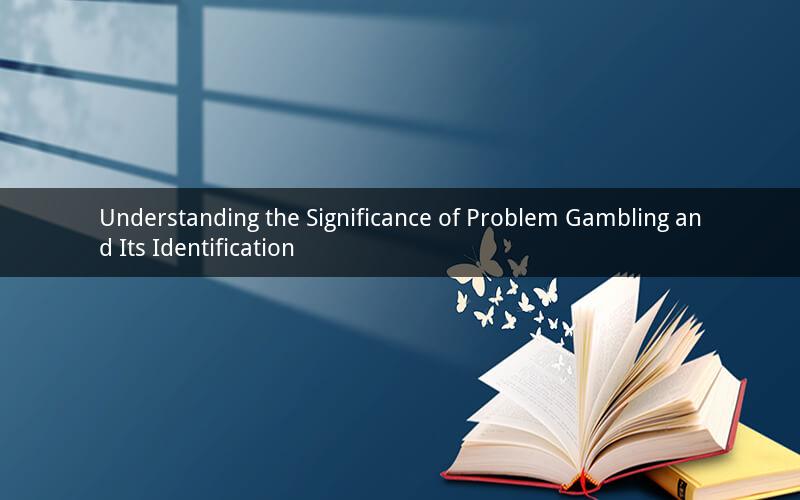
Introduction:
Problem gambling, often referred to as gambling addiction, is a serious issue that affects individuals, families, and society as a whole. Determining when gambling is considered a problem is crucial for early intervention and support. In this article, we will explore the signs and symptoms that indicate problem gambling, the impact it has on individuals, and the importance of seeking help.
Signs and Symptoms of Problem Gambling:
1. Loss of Control: One of the primary indicators of problem gambling is the inability to control the urge to gamble. Individuals may find themselves betting more money or time than intended, despite negative consequences.
2. Preoccupation with Gambling: A significant amount of time is spent thinking about gambling, planning how to obtain money for gambling, or reliving the experience.
3. Neglecting Responsibilities: Problem gamblers may neglect their personal, professional, and family responsibilities due to their gambling addiction. This can include missing work, ignoring children, or failing to meet financial obligations.
4. Risky Behavior: Gamblers may engage in increasingly risky behaviors, such as borrowing money, selling possessions, or even committing crimes to fund their gambling habits.
5. Emotional and Physical Consequences: Problem gambling can lead to significant emotional and physical consequences, including depression, anxiety, insomnia, and substance abuse.
Impact of Problem Gambling:
1. Financial Consequences: Problem gambling can result in severe financial distress, leading to debt, bankruptcy, and even homelessness.
2. Relationships: Gambling addiction can strain relationships with family, friends, and colleagues, often leading to conflicts and isolation.
3. Mental Health: Problem gambling is closely linked to mental health issues, such as depression, anxiety, and substance abuse disorders.
4. Legal Issues: Gamblers may face legal consequences due to their actions, such as fraud, theft, or gambling-related offenses.
5. Health Problems: Problem gambling can lead to physical health issues, such as heart disease, stroke, and other chronic conditions.
When is Gambling Considered a Problem?
Determining when gambling is considered a problem can be challenging, as it varies from person to person. However, certain criteria can help identify when gambling has become problematic:
1. Financial Distress: If gambling is causing financial difficulties, such as debt, bankruptcy, or theft, it is likely a problem.
2. Neglecting Responsibilities: When gambling is causing individuals to neglect their personal, professional, or family responsibilities, it is a significant concern.
3. Emotional and Physical Consequences: If gambling is leading to emotional and physical health issues, it is crucial to seek help.
4. Relationship Strain: When gambling is causing conflicts and strain in relationships, it is a sign of a potential problem.
5. Continued Use Despite Consequences: If individuals continue to gamble despite negative consequences, it is a clear indication of a problem.
Seeking Help:
Identifying problem gambling is the first step towards seeking help. Here are some resources and steps to consider:
1. Professional Help: Seeking the assistance of a mental health professional or a gambling counselor can provide individuals with the necessary support and guidance.
2. Support Groups: Joining a support group, such as Gamblers Anonymous, can provide individuals with a sense of community and support from others who have experienced similar struggles.
3. Financial Counseling: If gambling has caused financial difficulties, seeking the help of a financial counselor can assist in developing a plan to manage debt and prevent future problems.
4. Legal Assistance: If individuals have faced legal consequences due to gambling, consulting with a lawyer can provide guidance on resolving any legal issues.
5. Education and Awareness: Increasing awareness about problem gambling and its consequences can help individuals recognize the signs and seek help when necessary.
In conclusion, determining when gambling is considered a problem requires recognizing the signs and symptoms of gambling addiction. Early intervention and seeking help are crucial for individuals, families, and society. By understanding the impact of problem gambling and taking proactive steps to address it, we can work towards a healthier and more sustainable approach to gambling.
Questions and Answers:
1. Q: Can problem gambling occur in someone who has never lost a significant amount of money?
A: Yes, problem gambling can occur regardless of the amount of money lost. It is more about the behavior and the impact on the individual's life, rather than the monetary value.
2. Q: Is problem gambling more common in certain demographics?
A: While anyone can develop a gambling addiction, certain demographics, such as individuals with a family history of addiction, those with mental health issues, and young adults, may be at a higher risk.
3. Q: Can problem gambling be cured?
A: Problem gambling can be managed and treated effectively, but it is not a condition that can be completely cured. With proper support and treatment, individuals can learn to control their gambling behavior and reduce its negative impact on their lives.
4. Q: Is it possible for someone to gamble responsibly?
A: Yes, it is possible for individuals to gamble responsibly. However, it requires setting limits, being aware of the risks, and seeking help if gambling starts to become problematic.
5. Q: How can I support a loved one who is struggling with problem gambling?
A: You can support a loved one by being supportive, non-judgmental, and encouraging them to seek help. It is also important to educate yourself about problem gambling and its consequences to better understand and support your loved one's journey towards recovery.